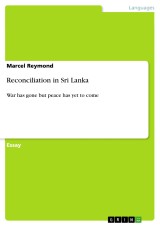Details

Reconciliation in Sri Lanka
War has gone but peace has yet to come1. Auflage
|
13,99 € |
|
| Verlag: | Grin Verlag |
| Format: | EPUB, PDF |
| Veröffentl.: | 17.10.2012 |
| ISBN/EAN: | 9783656290919 |
| Sprache: | englisch |
| Anzahl Seiten: | 14 |
Dieses eBook erhalten Sie ohne Kopierschutz.
Beschreibungen
Essay from the year 2012 in the subject South Asian Studies, South-Eastern Asian Studies, grade: A, , course: INTL5550, language: English, abstract: On May 18, 2009 the Government of Sri Lanka (GoSL) declared victory over the Liberation Tigers of Tamil Eelam (LTTE) and ended a 30-year conflict. The way the final phase of the war was fought, how it ended and what happened with the Tamil civilians and LTTE combatants at the end of the hostilities became a controversial issue.
The Security Council (SC) considered the war and the internments of the internally displaced people (IDP) as an internal matter.
The GoSL always called the final stage of the war a “humanitarian rescue operation” and presented its actions as part of a large hostage rescue operation (This was based on the well-known fact that the Liberation Tigers of Tamil Eelam (LTTE) were holding back civilians in its territory). At the end of the hostilities, civilians were put in overcrowded, closed camps for “InternalIy Displaced Persons” (IDPs) with limited humanitarian assistance where they were exposed to harassment by security forces who were looking for LTTE fighters likely to be hiding among them.
After more than a year, on June 22, 2010 the SG announced the appointment of an ‘Experts’ Panel’ to inform him of the progress of the commitment made by the GoSL after his visit in 2009. The UN Panel of Experts completed its report at the end of March 2011 and made it public on April 25. The Lessons Learned and Reconciliation Commission's (LLRC) accountability initiative had by then conducted eight months of public hearings and the GoSL was very concerned that the earlier publication of the UN Panel report would compromise its domestic driven initiative.
Past events are the underlying cause for a need for a reconciliation process. They are well documented and the author has referred to them when strengthening or clarifying an argument. The length of this document does not however, allow for a detailed account of the conflict history in Sri Lanka.
This essay will firstly analyze the process that led to the establishment of the LLRC and its working modalities including its mandate. Secondly, it will critically assess the final report and a selection of LLRC major findings of the LLRC. It will then discuss some key elements, based on the framework of restorative justice, which could be deemed essential for an improved reconciliation process in Sri Lanka. As a conclusion, it will propose required key short- and long-term policy changes in order to facilitate the reconciliation process.
The Security Council (SC) considered the war and the internments of the internally displaced people (IDP) as an internal matter.
The GoSL always called the final stage of the war a “humanitarian rescue operation” and presented its actions as part of a large hostage rescue operation (This was based on the well-known fact that the Liberation Tigers of Tamil Eelam (LTTE) were holding back civilians in its territory). At the end of the hostilities, civilians were put in overcrowded, closed camps for “InternalIy Displaced Persons” (IDPs) with limited humanitarian assistance where they were exposed to harassment by security forces who were looking for LTTE fighters likely to be hiding among them.
After more than a year, on June 22, 2010 the SG announced the appointment of an ‘Experts’ Panel’ to inform him of the progress of the commitment made by the GoSL after his visit in 2009. The UN Panel of Experts completed its report at the end of March 2011 and made it public on April 25. The Lessons Learned and Reconciliation Commission's (LLRC) accountability initiative had by then conducted eight months of public hearings and the GoSL was very concerned that the earlier publication of the UN Panel report would compromise its domestic driven initiative.
Past events are the underlying cause for a need for a reconciliation process. They are well documented and the author has referred to them when strengthening or clarifying an argument. The length of this document does not however, allow for a detailed account of the conflict history in Sri Lanka.
This essay will firstly analyze the process that led to the establishment of the LLRC and its working modalities including its mandate. Secondly, it will critically assess the final report and a selection of LLRC major findings of the LLRC. It will then discuss some key elements, based on the framework of restorative justice, which could be deemed essential for an improved reconciliation process in Sri Lanka. As a conclusion, it will propose required key short- and long-term policy changes in order to facilitate the reconciliation process.

















